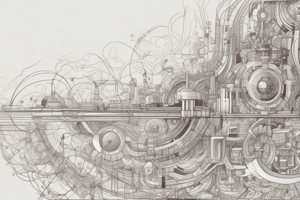Podcast
Questions and Answers
Which of the following best describes the role of empirics in research?
Which of the following best describes the role of empirics in research?
- Abstract concepts tested through logical reasoning.
- Mathematical proofs establishing irrefutable truths.
- Untested theories awaiting future validation.
- Observations derived from personal experiences and senses. (correct)
How does a hypothesis relate to a theory?
How does a hypothesis relate to a theory?
- A hypothesis is an untested assumption, while a theory is a well-substantiated explanation. (correct)
- A hypothesis is a proven scientific law, while a theory is a speculative idea.
- A hypothesis and a theory are the same thing.
- A hypothesis is a generalized explanation, while a theory is a specific guess.
What is the critical characteristic of a scientific law?
What is the critical characteristic of a scientific law?
- It is a guess that explains the causes of a particular observation.
- It is an unbreakable truth that forms the basis of scientific reasoning. (correct)
- It is a generalized explanation for a set of related phenomena.
- It is based on observations and can be revised with new evidence.
In the context of research variables, what distinguishes an independent variable from a dependent variable?
In the context of research variables, what distinguishes an independent variable from a dependent variable?
What role does an intervening variable play in a research study?
What role does an intervening variable play in a research study?
Which of the following is NOT a way to organize theories in International Relations (IR)?
Which of the following is NOT a way to organize theories in International Relations (IR)?
Which level of analysis focuses on the characteristics that differentiate individuals from one another?
Which level of analysis focuses on the characteristics that differentiate individuals from one another?
What is the primary focus of the 'state' level of analysis in international relations?
What is the primary focus of the 'state' level of analysis in international relations?
Which concept best describes the international environment in neo-realism?
Which concept best describes the international environment in neo-realism?
What is the role of state sovereignty in neo-realist theory?
What is the role of state sovereignty in neo-realist theory?
In the context of system characteristics, what does it mean to say 'we only live in one system'?
In the context of system characteristics, what does it mean to say 'we only live in one system'?
Which paradigm of international relations emphasizes cooperation and interdependence?
Which paradigm of international relations emphasizes cooperation and interdependence?
What is a core belief of realism in international relations?
What is a core belief of realism in international relations?
Unlike Realism, Liberalism views the world as more...
Unlike Realism, Liberalism views the world as more...
What is the focus of analysis within constructivism?
What is the focus of analysis within constructivism?
According to constructivism, what shapes the social world?
According to constructivism, what shapes the social world?
Which of the following best describes Ontology?
Which of the following best describes Ontology?
Which of the following best describes Epistemology?
Which of the following best describes Epistemology?
How does positivism relate to the paradigms of realism and liberalism?
How does positivism relate to the paradigms of realism and liberalism?
What is the central tenet of Radicalism (Marxism) in international relations?
What is the central tenet of Radicalism (Marxism) in international relations?
Flashcards
Empirics
Empirics
Observations made through our five senses that can be personally experienced and verified by others to ensure reliability and accuracy.
Hypothesis
Hypothesis
A preliminary explanation or educated guess for an observation or phenomenon between two or more events.
Theory
Theory
A generalized explanation of why students who sleep better get better grades (can derive from hypothesis).
Scientific Law
Scientific Law
Signup and view all the flashcards
Proof and Methods
Proof and Methods
Signup and view all the flashcards
Dependent variable
Dependent variable
Signup and view all the flashcards
Independent variable
Independent variable
Signup and view all the flashcards
Intervening variable
Intervening variable
Signup and view all the flashcards
Individual characteristics
Individual characteristics
Signup and view all the flashcards
State characteristics
State characteristics
Signup and view all the flashcards
System characteristics
System characteristics
Signup and view all the flashcards
Paradigms of International Relations
Paradigms of International Relations
Signup and view all the flashcards
Realism
Realism
Signup and view all the flashcards
Liberalism
Liberalism
Signup and view all the flashcards
Constructivism
Constructivism
Signup and view all the flashcards
Ontology
Ontology
Signup and view all the flashcards
Epistemology
Epistemology
Signup and view all the flashcards
Neo-Realism
Neo-Realism
Signup and view all the flashcards
Radicalism (Marxism)
Radicalism (Marxism)
Signup and view all the flashcards
Feminism
Feminism
Signup and view all the flashcards
Study Notes
- Theories can be tested or untested, and everyone has their own
Key Research Terms
- Empirics are observations from our five senses that can be experienced personally.
- Observations should be repeatable by others to verify reliability and accuracy.
- Observations should be viewed objectively to determine if they are true or false.
- A hypothesis is a guess that explains the causes or processes of a particular observation between two or more events.
- A theory is one step above a hypothesis, and is a generalized explanation.
- A scientific law is an unbreakable truth that forms the basis of subsequent science.
- Proof generally implies a conclusive determination of an answer.
- Proof requires deductive argumentation based on accepted true axioms.
- Evidence generally implies support for a particular position.
Variables
- A dependent variable relies on something/ changes in something else, and is usually the effect.
- An independent variable is usually the cause.
- An intervening variable is an intervention.
- The importance of explaining variable changes is not constant.
Organizing Theories in IR
- Theories can be organized by categories like:
- Author
- Dependent variables
- Independent variables
- Region/historical time period
- Philosophical origin
Levels of Analysis
- Analysis can be done in three levels:
- Individual
- State
- System
Individual Characteristics:
- Variables make people different, like choices, race, gender, ethnic background, nationality, etc.
- Personality of leaders, perception of leaders, choices made at the individual level are important.
State Characteristics
- Type of government (democracy etc.)
- Type of economic system
- Type of institutions, existence of institutions
- Geographical factors, size, resources of the state (e.g., Japan as an island state, China as a continental state)
- Economic characteristics, number of people working
System Characteristics
- Focus on different world/system that existed
- Organizing principles between states
- Number and type of non-state global actors
- Breadth of global civil society
- Number and type of states
Examples of State and Individual actions
- Saddam Hussein committed human rights atrocities = Individual
- The United States has the responsibility to protect citizens from another country due to military power, size, and representation of Western values = State
Paradigms of International Relations
- Paradigms are based on a set of assumptions from people who share the same views
- Paradigms encompass a worldview, agreement on basic analysis units, key problems, and a theory or set of theories for explanation
- Examples include: Realism, Liberalism, and Constructivism
- Theories under these paradigms range from the most agreeable to the least agreeable
Realism
- Basic assumption is that the world is inherently conflictual
- Dominant actors are nation-states
- Focuses on understanding why problems occur more at sometime and less at some time
- Practical problems involve mitigating conflict or protecting oneself from conflict and its consequences
Liberalism
- Cooperation is more common
- Dominant actors are individuals with rights/freedom
- Focuses on understanding why cooperation occurs or doesn't, and the role of international society (individuals)
- Examines how individuals create institutions and how these institutions influence the role of states
Constructivism
- The world exists only in our perception; it is created and not objective
- States exist because of shared beliefs
- Focuses on ideas and perceptions
Epistemology and Ontology
- Ontology explores what the world is, what is real, and what exists
- Epistemology examines how we can know something and determine its truth
Positivism and Post-Positivism
- Positivism aligns with realism/liberalism
- Post-positivism aligns with constructivism/critical theory
- Critical Theory and constructivism are more aligned to post-positivism, while liberalism and realism are more to positivism
Basic Theories
Neo-Realism:
- Anarchy exists due to no authority above the state, and no world government/police
- The international system is anarchic, and states are sovereign/responsible
- State and security are key
- Might Makes Right - States attempt to gain as much power as possible, constrained by other states
- A stable system exists in a balance of power when conflict occurs
Radicalism (Marxism)
- Class is the most important variable/distinction
- Focuses on imperialism and the cycle of dependency
Neo-liberalism
- Examines cooperation and peace, and why states mostly exist in peace.
- Explores why some countries don't enter into conflict despite anarchy
Feminism
Studying That Suits You
Use AI to generate personalized quizzes and flashcards to suit your learning preferences.




